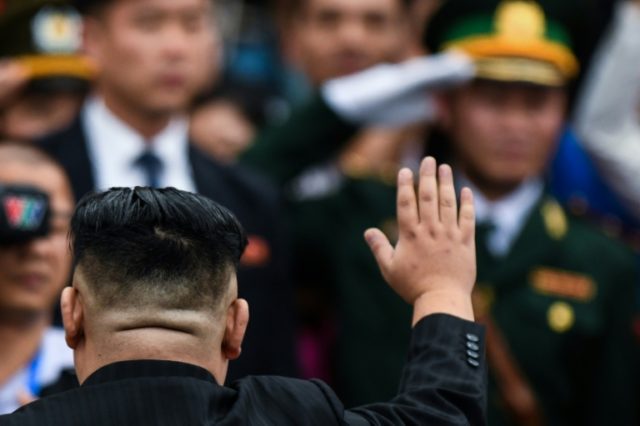North Korean Vice Foreign Minister Choe Son Hui on Friday issued the most direct threat to cut off negotiations with the United States since the Hanoi summit, accusing the U.S. of “gangster-like” behavior and insisting her government will not yield on the demands it made during the second meeting between dictator Kim Jong-un and U.S. President Donald Trump.
“We have no intention to yield to the US demands [put forward at the Hanoi summit] in any form, nor are we willing to engage in negotiations of this kind,” Choe said at a news conference in Pyongyang.
Choe accused U.S. Secretary of State Mike Pompeo and National Security Adviser John Bolton of creating an “atmosphere of hostility and mistrust” which “obstructed the constructive effort for negotiations between the supreme leaders of North Korea and the United States.”
The North Korean diplomat mixed these condemnations of Trump’s top advisers with praise for the president himself, insisting the “chemistry” between Trump and Kim remains “mysteriously wonderful.”
“I want to make it clear that the gangster-like stand of the U.S. will eventually put the situation in danger. We have neither the intention to compromise with the U.S. in any form nor much less the desire or plan to conduct this kind of negotiation,” she said.
Like other North Korean diplomatic representatives before her, Choe blasted the U.S. for insisting on complete denuclearization before sanctions relief is granted.
“What is clear is that the U.S. has thrown away a golden opportunity this time,” she said of the failed Hanoi talks.
Choe explicitly threatened to resume banned ballistic missile launches and nuclear weapons tests if the U.S. does not soften its position on denuclearization, saying Kim would “clarify his position” on resuming nuclear activity soon.
She refused to comment when asked if recent activity at North Korea’s launch sites indicates a new missile test or “satellite launch” – i.e. a disguised missile test – might occur soon.
Pompeo and Bolton both offered swift, and not terribly concerned, responses to Choe’s remarks.
Bolton said her description of the current state of diplomacy between Washington and Pyongyang was “inaccurate,” while Pompeo said he has a “vague recollection of being called gangster-like” by North Korean officials before, a jocular reference to North Korea hurling the exact same epithet at him in July for the same reason.
“And following that we continued to have very professional conversations,” Pompeo pointed out. “I have every expectation we will be able to continue to do that.”
“It’s the administration’s desire that we continue to have conversations around this,” he said. “As the president said when he was in Hanoi, the offer that they made simply didn’t rise to the level that was acceptable, given what they were asking for in exchange.”
Pompeo reminded reporters that Kim personally promised he would not resume testing nuclear weapons or ballistic missiles when he met with President Trump in Vietnam.
“That’s Chairman Kim’s word. We have every expectation he will live up to that commitment,” he said.
Clearly both the Trump administration and the South Korean government wish to keep North Korea at the bargaining table, so they are responding to Choe’s remarks with good humor, but the speed of the response in both Washington and Seoul suggest he press conference on Friday is seen as the most serious evidence to date of real danger to the diplomatic process.
“We cannot judge the current situation based solely on Vice Minister Choe Son-hui’s statements. We are watching the situation closely. In any situation, our government will endeavor for the restart of North Korea-U.S. negotiations,” the office of South Korean President Moon Jae-in said on Friday.
South Korea’s Unification Ministry revealed on Friday that a weekly meeting with North Korean representatives at the Kaesong joint industrial complex has been canceled by Pyongyang’s request for the past three weeks. The first cancellation was nominally due to International Women’s Day, but no explanation was given for the following two.
North Korean media did its part on Thursday by urging the United States to accept the offer it rejected in Hanoi: large-scale sanctions relief in exchange for North Korea dismantling the nuclear facility at Yongbyon. U.S. officials explained that decommissioning Yongbyon would not do enough to irreversibly end North Korea’s nuclear missile program, while the concessions North Korea demanded would effectively unravel the sanctions regime.
Secretary of State Pompeo does not seem surprised by this crisis in North Korean diplomacy, and no one else in Washington or Seoul should be. Pyongyang’s playbook has not changed in three decades.
It is encouraging that North Korea is the party that seems surprised for a change, because the old ploy of offering limited, reversible, or entirely symbolic action in exchange for concessions that would completely dismantle the sanctions regime did not work. Hanoi was supposed to be the part of the same old story where the U.S. accepted a meager offer from North Korea and declared diplomatic victory, only to watch the North Koreans take back everything they “gave away” a few months later and demand fresh concessions to refrain from further provocations.
Instead, the U.S. president walked away from the table, and according to Vice Foreign Minister Choe, a member of the North Korean delegation complained about taking the long train ride to Hanoi only to return empty-handed. That is very encouraging news.

COMMENTS
Please let us know if you're having issues with commenting.